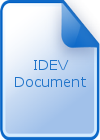IDEV’s mandate is anchored by the AfDB’s Independent Evaluation Policy and Independent Evaluation Strategy. The Independent Evaluation Strategy 2013-2017 (IES, extended to 2019) was developed as a response to a self-assessment of the Bank’s independent evaluation function in 2012. The Strategy was the first of its kind among MDBs and sought to link the Bank’s Independent Evaluation Policy to IDEV’s three-year work program. It identified three complementary objectives of evaluation, namely: i) accountability; ii) learning; and iii) promoting an evaluation culture, and committed IDEV to undertaking a number of measures, actions and activities to help it contribute to the Bank’s development effectiveness.
In 2017-2018, to prepare for a discussion on the strategic directions for IDEV after the expiry of the IES, IDEV initiated three key reviews to assess its performance and draw lessons and recommendations from its current practices: i) a self-evaluation of the implementation of the 2013-2017 IES; ii) an external quality assessment of its evaluation products; and iii) an Independent Peer Review as a means of supplementing the self-evaluation.
i. The self-assessment of the 2013-2017 Independent Evaluation Strategy
The self-assessment served a double purpose: one of accountability to the Board (via CODE) and other IDEV stakeholders on the implementation of the strategy, and the other of learning. The objectives of the self-assessment were to assess the extent to which IDEV had succeeded in implementing the Strategy as intended, and to draw lessons to improve IDEV’s future performance. Overall, the self-assessment concluded that the implementation of the Strategy was satisfactory. It identified areas where progress was made and the factors that have hindered progress, as well as the strengths and weaknesses of IDEV. The assessment concluded that IDEV performed well in some aspects such as: structural changes, additional resource mobilization, quality and quantity of delivery of evaluations, and enhanced knowledge management and communication. The assessment also highlighted areas where IDEV needs to improve, including: i) improving processes through the finalization of the evaluation manual, an appropriate system of work program planning and monitoring, etc.; ii) enhancing engagement and communication with stakeholders as well as finding innovative ways of sharing knowledge; and iii) promoting an evaluation culture through knowledge management and communication.
ii. The external quality assessment of IDEV evaluation products
A sample of 22 IDEV evaluations, from before and after the adoption of the IES, were independently quality-assessed. The objective was to find out whether there has been improvement in the quality of evaluations delivered during the Strategy period. Overall, the independent quality assessment showed a notable increase in the quality of evaluations over the Strategy period. Stronger quality assurance processes and the strong stance of IDEV management on quality have contributed to this.
iii. The Independent Peer Review
Led by a panel of independent evaluation experts, the Independent Peer Review examined the extent to which IDEV’s products, activities and institutional context align with international good practices and standards for evaluation, particularly at the level of Independence, Credibility, and Utility.
The report concludes that IDEV performed relatively well in terms of independence and credibility. However, the assessment of utility (in particular the use by Bank Management of evaluations) remains less than satisfactory, as it is a common challenge for operations departments at international institutions to fully leverage on the findings and lessons learned from independent evaluations.
To improve the utility and further optimize the independence and credibility of the AfDB’s independent evaluation function, the report makes several recommendations to the AfDB Board of Directors and Senior Management, and to IDEV and its Incoming Evaluator General. The Board, Management and IDEV subsequently prepared a Joint Response to the recommendations.
CODE discussed the independent peer review, the self-assessment and the quality assessment in early 2019, and expressed appreciation for the three reports. It encouraged IDEV to follow up on the recommendations made, paying particular attention to: i) ensuring the harmonization and quality of evaluation methods; ii) better reflection of cross-cutting issues in evaluations; and iii) wider dissemination of evaluation results. It encouraged IDEV and Bank Management to work together to strengthen the evaluation culture within the Institution and to ensure concrete and systematic implementation of IDEV’s recommendations as well as greater use of evaluation results.
On the question of the way forward, namely whether to develop a new evaluation strategy or, as an alternative, to include a chapter on strategic directions in IDEV's three-year work program, CODE recommended to extend the current Strategy until the end of 2019 to give the incoming Evaluator General the opportunity to develop his/her own strategic vision and take a stance on the need to develop, or not, a new evaluation strategy.
| Attachment | Size |
|---|---|
| Independent Peer Review Report 2019_0.pdf | 1.15 MB |
| Joint response to the IPR report.pdf | 452.05 KB |
| Quality Assessment of Evaluation Products.pdf | 2 MB |
| IDEV Strategy Assessment Summary Report.pdf | 2.41 MB |
